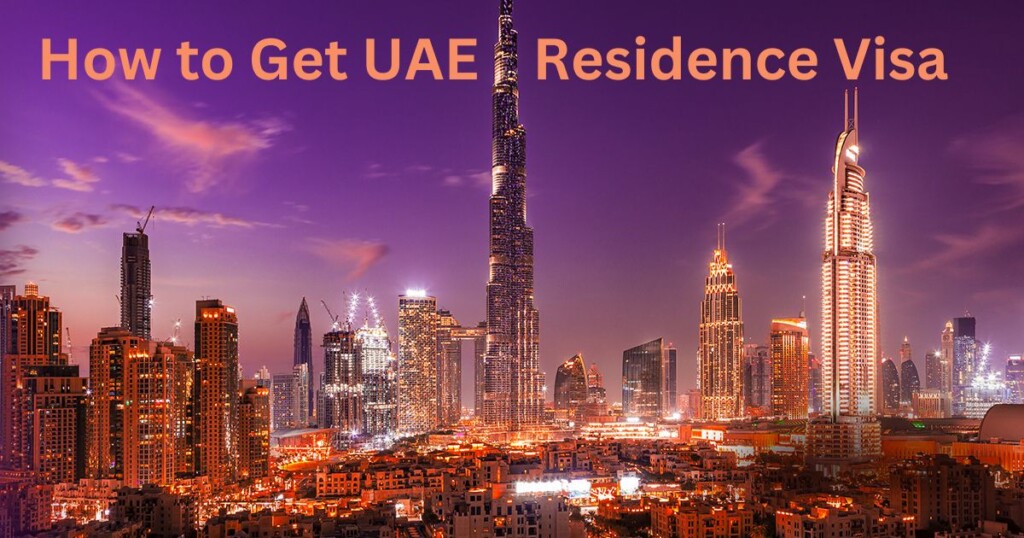Foreigners who desire to stay and work in the United Arab Emirates for an extended period of time must get a UAE Residence Visa. There are several advantages to having a residency visa for the UAE, including:
- A Bank Account can be opened.
- You can apply for a personal or auto loan from a bank.
- Several nations are accessible to you without a visa
- You may obtain a driver’s licence;
- Your kids can attend public or private schools;
- You have access to government health services and health insurance.
To be eligible for a residence visa for the UAE, you must fulfil a number of requirements, such as obtaining employment or making an investment in one of the emirates.
Who may apply for a UAE residence visa?
To be eligible for a UAE Residence Visa, you must fall into one of the following categories:
- You will work in the UAE, either for a government agency or for a private enterprise.
- You will study at a UAE educational institution
- You are a dependant of a UAE citizen or foreign resident (child, parent, maid, or close family)
- You have made investments in the UAE
- You have acquired properties in the UAE
Types of UAE Residence Visas
The sorts of UAE residence visas are classified according to the purpose of your trip. As a result, there is:
- UAE Work Visa, given to foreigners who have found work in the UAE and secured a Work Permit.
- UAE Student Visa, which is granted to foreign nationals admitted into a UAE educational institution.
- UAE Family Visa, which is granted to close relatives of UAE nationals or international residents.
- The UAE Investment Visa (long-term residency) is granted to foreign nationals who make a significant investment in the UAE. This visa is valid for a longer period of time than other types of resident visas (up to 10 years).
- The UAE Retirement Visa, which is granted to older foreigners who choose to retire in the UAE and have the appropriate financial resources.
- Work Remotely from Dubai programme, which is available to prospective freelancers who wish to work remotely in Dubai.
- What are the prerequisites for obtaining a UAE residence visa?
When applying for a UAE Residence Visa, you must have a number of supporting papers, including:
- The UAE Visa Application Form, which may be downloaded online or at a typing centre.
- Your original passport
- Two passport-sized photographs in accordance with UAE visa photo criteria
- Your visa for entrance.
- Evidence of your sponsor’s legal residency / UAE citizenship • Evidence that you have completed a medical fitness test.
- Evidence of UAE health insurance coverage.
When trying for family visas, provide proof of family ties, like birth/marriage certificates.
For a work visa, your sponsor must submit a work contract as well as copies of the company’s valid trade licence and valid firm card. • Any other papers connected to your trip purpose.
- UAE Work Visa
- UAE Family Visa
- UAE Student Visa • UAE Investment Visa • UAE Retirement Visa *All foreign nationals who wish to live in the UAE on a Residence Visa must pass a medical exam to demonstrate their fitness.
Application for a UAE Resident Visa
You must apply for a Residence Visa once you have arrived in the UAE, which means you must first come with an entrance permission. Furthermore, like with the entrance permit, you cannot apply for your own resident visa: you must have a sponsor, such as your employer, spouse, or others, apply on your behalf.
Who is eligible to apply for a resident visa in the UAE?
A Residence Visa may only be obtained through a sponsor. In some situations, though, you may be your own sponsor. Your employer is your sponsor for a UAE Work Visa; your school is your sponsor for a UAE Student Visa; and your family member is your sponsor for a UAE Family Visa.
If you are an investor or buy property in the UAE, you can apply yourself and your company/property serves as sponsorship
How Do I Get a UAE Resident Visa?
First, your sponsor must get an Entry Permit for you at one of the following locations:
- The National Identification and Citizen Authorities
- The ICA’s eChanel site
- Apple and Android mobile applications
- The General Directorate of Residency and Foreigners Affairs – GDRFA can be contacted either online (see links below) or in person. If the recipient applies in person, they must do so through one of the GDRFA’s licenced typing centres in each Emirate or any of the Amer centres in Dubai.
Once you arrive in the country, your sponsor must apply for your Residence Visa at the applicable emirate’s General Directorate of Residency and Foreigners Affairs (GDRFA).
They will also pay a UAE Residence Visa cost at the time of application, depending on the validity of your visa.
When your application is granted, the GDRFA will stamp your passport with a Residence Visa and provide you an Emirates ID that is valid for the same period as the visa.
The GDRFA’s webpages in each emirate:
- Abu Dhabi
- Dubai (Also see Amer, an online portal where Dubai citizens and residents may apply for family reunion and tourists may extend their Visa On Arrival.)
- Sharjah
- Ajman
- Ras Al Khaimah
- Fujairah
Fees for UAE residency visas
The costs for a UAE Residence Visa vary based on the period of your visa. The UAE Residence Visa price is AED100 for one year.
You will also have to pay a processing fee, which varies depending on where you apply and can vary from AED70 if you apply in person to AED40 if you apply online.
Please bear in mind that visa fees are subject to vary, and you will also be required to pay additional expenses for medical tests and health insurance.
The distinction between an entry permit and a residence visa in the UAE
The distinction between an Entry Permit and a Residence Visa for the UAE is as the name implies:
The Entry Permit permits the bearer to enter the UAE for a set period of time (typically up to three months). Entrance permits are provided based on the reason for your visit. A UAE Tourist Visa, for example, is entrance permission for tourism reasons.
Before you may enter the UAE, your sponsor must apply for your entrance permit. Your sponsor may apply for your resident visa once you are in the country on an entrance permit.
Furthermore, certain nationalities do not require or can get entrance permission upon arrival. Basically, if you are not need to obtain a UAE Tourist Visa, you do not need to obtain entrance permission because the two are nearly identical.
See who is excluded and how to apply for a UAE Entry Permit (UAE Visa).
The Residence Visa entitles the holder to long-term residency in the UAE. After you enter the country, your sponsor must apply to the applicable visa-issuing authorities for your resident visa, as mentioned above.
How long can I stay in the UAE with a residence visa?
The duration of your UAE Residence Visa is determined by the purpose of your trip: they are given for one, two, or three years and may be renewed.
Investment or retirement visas, on the other hand, are given for 5-10 years and are renewable.
Getting a UAE Residence Visa Renewal Once It Expired
Your sponsor must renew your Residence Visa within 30 days of its expiration date.
However, if you are inside the UAE resident visa expiration grace period, your sponsor may renew your visa after it has expired.
The method for renewing your UAE resident visa is the same as it was when you initially received it: your sponsor must apply at the General Directorate of Residency and Foreigners Affairs in the appropriate emirate.
What is the grace period for the UAE Residence Visa?
The UAE government provide expats with a 30-day grace period beginning when their entry permit ends. This implies that even if your visa has expired, you can stay for another 30 days; but, if you do not obtain a visa renewal by that time, you must leave the country and re-enter using an entrance permit.
If you overstay, you will be penalised for each additional day.
Overstay fee for UAE Residence Visa.
Overstaying your UAE Residence Visa will result in the following fees:
- AED 25 per day for the first six months (180 days)
- AED 50 per day for the second six months (180 days)
- AED 100 per day for each day that follows the first year.
- UAE visa renewal for widows and divorced women.
- The UAE government announced a new immigration law in October 2018 that permits widowed and divorced women who are UAE citizens to stay in the nation unaccompanied for a year beginning with the date of their spouses’ demise or their divorce. The new regulation also applies to the women’s offspring, if any.
- The ladies and/or children must have been travelling on the husband’s visa at the time of his passing or divorce and their passports must still be in effect at the time they apply in order to be eligible. They can submit the following to the GDRFA in order to apply:
- Evidence of divorce or death, when appropriate.
- The Emirates ID card, housing documentation, evidence of the woman’s ability to support herself financially, and medical clearance documents
There can only be one extension for this kind of visa.
What Takes Place If I Travel Outside The UAE For More Than Six Months? (Rules for UAE Re-Entry)
If you have residence permission and are residing in the UAE, it becomes invalid if you leave the country for more than six months. You cannot enter the nation again without asking for another permit. In this situation, your sponsor may submit another application for a residence permit on your behalf.
The Golden Visa holders and their family members (10-year visa holders) are free from the six-month residency requirement.
• Government employees who are stationed overseas for work or medical reasons.
• Investors who fall within a permitted categorization for residency.
• The spouse of an Emirati national who is supported by her spouse.
• Individuals who are supported by UAE embassies or consulates.
• Foreign-enrolled international students (if they reside in Dubai).
• Domestic workers who travel with their employers abroad.
How can I apply for a visa to live in Dubai?
The country of the United Arab Emirates (UAE) is made up of seven emirates, including Dubai.
Because of this, the procedure for obtaining a Dubai residence visa is the same as it is for any other emirate in the United Arab Emirates (as stated above).
You need a sponsor in Dubai in order to invest or purchase property there. Then, at one of the authorised typing locations of the General Directorate of Residency and Foreigners Affairs (GDRFA) in Dubai or an Amer centre, your sponsor must submit an application for your admission permit and resident visa.

